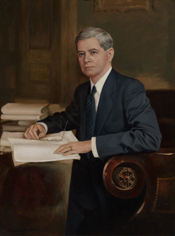James P. Buchanan
James Paul Buchanan (born April 30, 1867 in Midway , Orangeburg County , South Carolina , † February 22, 1937 in Washington, DC ) was an American politician . Between 1913 and 1937 he represented the state of Texas in the US House of Representatives .
Career
James Buchanan was a cousin of Congressman Edward W. Pou (1863-1934) from North Carolina . In the year he was born, he moved with his parents to Chappell Hill , Texas, where he later attended public schools. After a subsequent law degree at the University of Texas at Austin and his admission to the bar in 1889, he began to work in this profession. Buchanan was a Justice of the Peace in Washington County from 1889 to 1892 . He then worked as a public prosecutor in various areas between 1892 and 1906. At the same time he embarked on a political career as a member of the Democratic Party . From 1906 to 1913 he was a member of the Texas House of Representatives .
After the resignation of MP Albert S. Burleson , Buchanan was elected as his successor to the US House of Representatives in Washington, where he took up his new mandate on April 15, 1913, when the by-election was due for the tenth seat in Texas. After twelve re-elections, he could remain in Congress until his death on February 22, 1937 . From 1933 to 1939 he was chairman of the grant committee . During Buchanan's time as a congressman, the First World War fell among other things . Since 1933, many of the federal government's New Deal laws have been passed in Congress under President Franklin D. Roosevelt . Between 1913 and 1933 the 16th , 17th , 18th , 19th , 20th and 21st amendments were ratified.
After Buchanan's death, future President Lyndon B. Johnson was elected to succeed him in Congress.
According to him, which is Lake Buchanan named in Texas.
Web links
- James P. Buchanan in the Biographical Directory of the United States Congress (English)
- Biography in the Handbook of Texas
- James P. Buchanan in the database of Find a Grave (English)
| personal data | |
|---|---|
| SURNAME | Buchanan, James P. |
| ALTERNATIVE NAMES | Buchanan, James Paul (full name) |
| BRIEF DESCRIPTION | American politician |
| DATE OF BIRTH | April 30, 1867 |
| PLACE OF BIRTH | Midway , South Carolina |
| DATE OF DEATH | February 22, 1937 |
| Place of death | Washington, DC |

